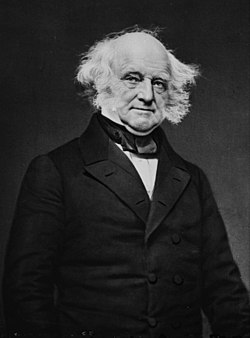📖 Presidential Profile
Comprehensive overview of leadership, policies, and historical significance
📋 Biography & Political Journey
The Little Magician’s Political Mastery
Martin Van Buren earned the nickname “The Little Magician” for his extraordinary political skills and ability to build coalitions behind the scenes. Standing just 5 feet 6 inches tall, Van Buren was a master of political organization who helped create the modern Democratic Party and established many of the political practices still used today. He was the principal architect of the “Albany Regency,” a powerful political machine in New York that controlled state politics through patronage and party discipline. Van Buren understood that political parties were essential for democratic governance and worked tirelessly to build a national Democratic organization.
Van Buren was the first president born as an American citizen (all previous presidents were born as British subjects before independence) and the first whose native language was not English—he grew up speaking Dutch in Kinderhook, New York. His political philosophy centered on strict constitutional interpretation and limited federal government, continuing the Jeffersonian tradition. Van Buren served as Andrew Jackson’s vice president and was hand-picked by Jackson as his successor, running on a platform of continuing Jackson’s policies.
As president, Van Buren advocated for the Independent Treasury System, which would separate government finances from private banks. This policy reflected his belief that the federal government should not be entangled with private financial institutions, a principle born from his observation of the economic chaos caused by the Bank War during Jackson’s presidency. Van Buren’s commitment to limited government extended to his refusal to use federal power to address the economic crisis that dominated his presidency.
The Panic President’s Stubborn Response
Van Buren’s presidency was dominated by the Panic of 1837, a severe economic depression that began just months after he took office. While the crisis was largely caused by Andrew Jackson’s economic policies, including the destruction of the National Bank and the Specie Circular, Van Buren bore the political consequences. His response to the economic catastrophe was controversial and arguably counterproductive—he steadfastly refused to have the federal government intervene in the economy, believing that “the less government interferes with private pursuits, the better for general prosperity.” This laissez-faire approach meant that while businesses failed and unemployment soared, Van Buren offered no federal relief programs or stimulus measures, earning him the nickname “Martin Van Ruin.”
The President’s Extravagant White House Lifestyle
While Americans suffered through economic hardship, Van Buren lived lavishly in the White House, providing his political opponents with devastating ammunition. He installed gold spoons, expensive wines, and elegant furniture in the executive mansion, leading Congressman Charles Ogle to deliver a famous speech about “the Regal Splendor of the President’s Palace.” The most ridiculous controversy involved Van Buren’s alleged installation of a “bathtub with faucets made of solid gold,” though this was likely exaggerated by his political enemies. During the 1840 campaign, Whigs mockingly portrayed Van Buren as an aristocratic dandy who used cologne, wore corsets, and ate French food with golden cutlery while ordinary Americans struggled to put food on their tables. One particularly memorable attack claimed that Van Buren was so vain he had his hair curled and powdered daily at taxpayer expense, though contemporary portraits suggest his elaborate hairstyle was actually a wig.
Humor & Jokes
First Dutch President
Van Buren was the first president of Dutch descent. He brought European sensibilities to American…
Read More →Greatest Wins
🕊️ Peaceful Resolution of the Aroostook War
Van Buren prevented armed conflict between Maine and New Brunswick through skilled diplomacy, avoiding war…
Read More →Epic Fails
📉 Federal Inaction During the Panic of 1837
Van Buren's refusal to intervene during America's worst economic crisis deepened suffering and sparked fierce…
Read More →